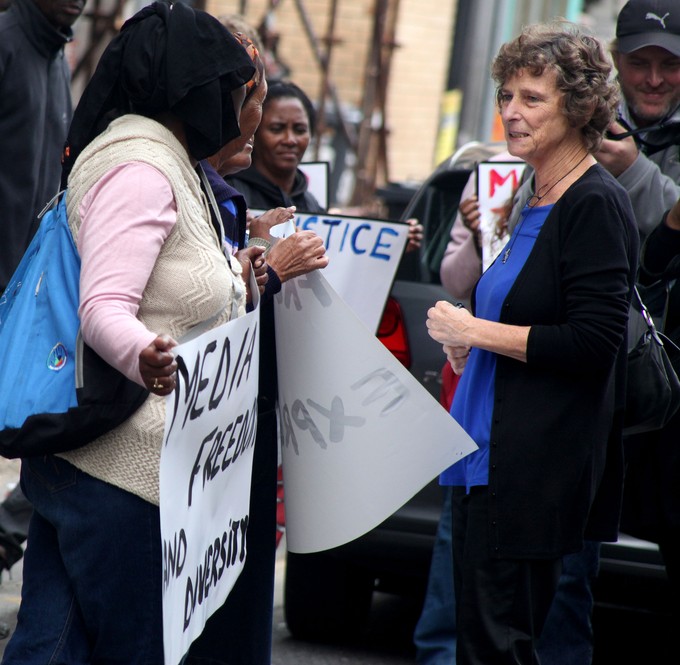
Alide Dasnois chats to Right2Know protesters outside the Labour Court earlier today. Her litigation had the support of Right2Know and the Open Democracy Advice Centre. Photo: Masixole Feni
9 May 2016
Alide Dasnois and Independent Newspapers have reached a settlement in the court case brought by Dasnois against the newspaper group. The text of a joint statement by the parties appears at the bottom of this article. In it, Independent withdraws allegations of racism against Dasnois.
For readers who don’t recall the events that led to this case about media freedom and editorial independence, Dasnois was the editor of the Cape Times in December 2013. On the night of 5 December 2013, Nelson Mandela died. On the morning of 6 December the Cape Times ran a wraparound in memory of Mandela. Time magazine in the United States voted the Cape Times coverage as one of the 14 best Mandela front pages in the world.
The inside front page story of the Cape Times ran a story about the Public Protector’s adverse finding on a fishing deal involving Sekunjalo. The article stated that the “public protector found Agriculture, Forestry and Fisheries Minister Tina Joemat-Pettersson guilty of maladministration, improper and unethical conduct in the irregular awarding of an R800-million tender to the Sekunjalo consortium to manage the state’s fishery vessels.” Sekunjalo had recently bought Independent Newspapers which publishes the Cape Times. (See GroundUp’s coverage of this on 8 December 2013.)
Dasnois was effectively fired as Cape Times editor over the phone by Iqbal Surve, the proprietor of Sekunjalo. Surve and/or Independent gave conflicting versions of why Dasnois was fired in the following days, with Surve eventually settling on the argument that running a wraparound in response to Mandela’s death was disrespectful.
A protest in December 2013 held in support of Dasnois and media freedom outside Independent Newspapers was disrupted by supporters of Sekunjalo.
Dasnois subsequently initiated legal action against Independent. She also joined GroundUp as associate editor.
About 15 members of Right2Know came out to protest in support of Dasnois outside the Labour Court in Cape Town earlier today. Organiser Vainola Makan told GroundUp, “Media is not something we have to take for granted. In South Africa there is still a long way to experience media freedom. Bosses of Media houses still are in favour of capitalism and money making. Today has been a victory for the media freedom.”
Here is the text of the joint statement following today’s settlement:
Since the removal of Alide Dasnois as editor of the Cape Times (on 6 December 2013, the day following the death of Nelson Mandela), her rejection of an alternative editorial post and the later termination of her employment, she and Independent Newspapers have been in dispute about these events and the reasons leading to them. Litigation in the Labour Court and the CCMA has been pending about these issues.
The parties have now reached an agreement settling the litigation and all outstanding matters between them and have, amongst other things, agreed the following:
In relation to the appropriateness of how the news of Nelson Mandela’s death was covered in the 6 December 2013 edition of the Cape Times, the parties have differing views. While Independent Newspapers does not agree with the decision taken by Alide Dasnois, as editor, to publish a special wraparound, Independent Newspapers acknowledges the following:
that her decision was not intended by her in any way to show disrespect for Nelson Mandela or his legacy, or to embarrass Independent Newspapers, its owners or management, and was a decision, in respect of which Alide Dasnois was exercising her prerogative as editor;
the parties however disagree about whether the manner in which she exercised this prerogative was appropriate;
Independent Newspapers further acknowledges that Alide Dasnois’ conduct was not motivated by racism and it retracts all allegations of racism made against her in the course of the proceedings that preceded the termination of her employment.
- Independent Newspapers confirms its ongoing commitment to the principles of press freedom and to media transformation in South Africa and achieving this through ensuring that: its publications have a diversity of content; its editors’ contracts emphasize the importance of balance, accuracy, fairness, all points of view and diversity; it subscribes to the Press Code of South Africa; and its employment practices promote non-racialism, non-sexism and diversity. Its Editorial Code of Conduct and Ethics affirms, amongst others, that its publications and editors will be “accurate, honest and fair” and “will be editorially independent of government, business, labour, civil society and all other vested interests.”